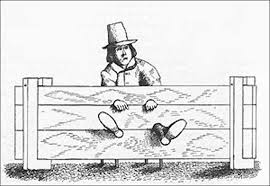The saying ‘spick and span’ once meant new, but means extra clean today. A span was a wood shaving. If something was newly built it would have tell-tale wood chips so it was ‘span new’, Spick is an old word for a nail. New spicks or nails would be shiny. However words and phrases often […]
Tag: saying
DYK: The true blue “Blue Bloods” – who are they?
For centuries the Arabs occupied Spain but they were gradually forced out during the Middle Ages. The upper class in Spain had paler skin than most of the population as their ancestors had not inter-married with the Arabs. As they had pale skin the ‘blue’ blood running through their veins was more visible. Translated from […]
DYK: Are you on Tender Hooks or I should say Tenter Hooks?
This is one of the most misquoted sayings. The word tenterhooks is often stated as tenderhooks. To be on tenterhooks is to be filled with painful or anxious anticipation or suspense, such as when you’re waiting for the result of an important medical test. A tenterhook is a metal hook that holds the cloth in place […]
DYK: Have you gone to pot? I hope it doesn’t mean this.
Around 1542, when the phrase first appeared, “to go to pot” was to be cut up like chunks of meat destined for the stew pot. When farm animals outlived their usefulness such as a hen that no longer laid eggs would literally go to pot. It was cooked and eaten. Such a stew was usually […]
DYK: Have you turned the corner?
DYK: Did you know? Did You Know that Turned the Corner is a nautical term? When Ships sailed past the Cape of Good Hope or Cape Horn were said to have ‘turned the corner’. Three complete historical novels in one book Tapestry of Love Historical Series 2nd edition 2015 – Court records dating back to the 1630s […]
DYK: the idiom “laughing stock” has an unclear source
The source of the idiom – LAUGHING STOCK is unclear. Stocks were a means of punishment in use at the time the phrase was coined, by which people were tortured or ridiculed. Victims were held by having their ankles, and occasionally the wrists too, trapped in holes between two sliding boards. The punishment, although not as harsh […]
DYK: Handle with kid gloves – what does it really mean?
Handle with kid gloves means to handle a situation, or a person or an object, delicately and gingerly. The phrase comes from the 1730’s when kid gloves were made from the skin of a young goat. They were not intended for use when you were working and wearing kid gloves usually indicated that the wearer […]
DYK: Cut and Run – Sometimes it’s not cowardly but is the best action
Cut and run is a phrase used in the context of a cowardly defeat but actually the phrase ‘Cut and Run’ is a nautical term. In an emergency rather than haul up an anchor the sailors would cut the anchor cable then run with the wind. In nautical usage however the term does not necessarily […]
DYK: Above board? What is the board?
DYK: Did you know? In the phrase ‘Above board’ What exactly is the board? The board is a table and comes from gambling activities. See larger image Faith and Courage: A Novel of Colonial America (Tapestry of Love) (Paperback) By (author): Causey, Donna R List Price: $13.33 New From: $13.33 In Stock
DYK: True meaning of Escaped by the skin of your teeth
Did You Know? ESCAPED BY THE SKIN OF YOUR TEETH – The expression is a Hebrew one that first appeared in this form in the Geneva Bible (1560). In Job 19:20, it reads: My bone cleaveth to my skin and to my flesh, and I am escaped with the skin of my teeth. This was a […]









